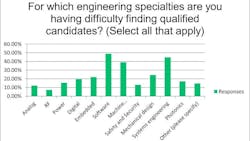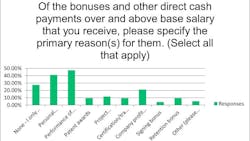Vision Systems Design recently conducted a salary and career survey among our readers. As was reported in our initial story summarizing survey results, most of our readers find engineering to be a rewarding, stable, interesting career with room for growth and advancement and nearly all of them said they would recommend engineering as a career path to a young person looking to choose a profession.
Related: Reader Survey: Engineering Solid, Satisfying, Recommended Career Path
Nonetheless, there seems to be a concern underpinning this optimism: many respondents to the VSD survey say they are worried about the availability of talent right now. In fact, 120 (64.7%) of 186 say they believe there is a shortage of engineers. While no respondent articulated why they believe this, other reports in the media and elsewhere could be a contributing factor. For example, the U.S. Bureau of Labor Statistics projected that between 2016 and 2024, the U.S. would see a shortage of at least 6 million engineers and many of those vacancies were projected to be in high tech sectors.
According to VSD’s survey, 126 (65.28%) out of 193 respondents reported that their organization is having difficulty finding qualified candidates for open engineering positions. And, of the 123 asked to respond specifically about 12 specialties within engineering, the top three hard-to-fill specialties were as follows: software engineering 60 (48.76%); systems engineering 55 (44.72%); machine learning/artificial intelligence 48 (39.02).
Gretchen Alper, who heads up Automation Technology’s (Bad Oldseloe, Germany) U.S. office in Boston, says she has not experienced undue difficulty finding qualified engineering candidates, although she points out that the office has been open less than a year, and the positions they fill are all engineering sales. That said, the candidates must have a technical/engineering background in order to succeed, as much of the job entails not only selling, but servicing and assisting the customer with integrating the system or service.
However, she also points out that, while she can find engineers whom she can train for machine vision, she actually has received very few applications from people who were already working in the machine vision space. She also notes that, while the job announcements requested 6-10 years’ experience, almost none of the applicants fell into that cohort; virtually all were either in early career or end of career stages.
“There may not be so much of a shortage of candidates as there are simply shifts in paradigms,” Alper says. “Fewer seem to be interested in specializing, and even fewer seem to be interested in committing to one company, job, or specialty for any length of time.”
Offering Incentives
It does appear that companies are trying to maintain and grow their talent resources. According to the survey, 63 of 191 respondents (32.96%) said their company is planning to increase the number of engineering jobs in the coming year and 107 (56.02%) say their company plans to maintain the current level of engineer jobs.
To that end, 28 (15.64%) of 179 respondents said their company has always offered sign-on bonuses for new engineers, 17 (9.5%) said their company recently added them, and 9 (5.03%) said their company has reinstated them And, of 95 respondents, 9 (9.47%) said they received a retention bonus in addition to salary and another 4 (4.21%) said they received a signing bonus.
There are other opportunities for a bonus or extra income. For example, Alper noted that, while Automated Technology does not offer sign-on bonuses for the sales engineer positions she has hired, the company does provide revenue-based bonuses.
Automated Technology is not alone. Of 95 respondents to VSD’s survey, 45 (47.37%) said they receive bonuses based on the performance of their company or division and another 39 (41.05%) said they receive bonuses based on personal performance, while 20 (21.05%) said they receive income beyond salary due to company profit sharing programs.
What Else Can Companies do to Adapt?
Andrew Tilley, a senior recruiter with Actalent Services (Hanover, MD, USA) who has recruited engineering talent for more than 20 years, says the talent pool has become smaller, therefore, it is especially important for a recruiter in today’s job market to understand candidate motivations as well as company expectations, which require deeper understanding of what each entity is seeking.
Tricia DeSipio, director of human resources at Edmund Optics (Barrington, NJ, USA), says the company contends with a shortage of engineers in the optical engineering space, and as part of its efforts to recruit and retain top talent, developed and launched its Engineering Leadership Program. The program, which was launched in 2008, is essentially a rotation program that allows newly onboarded engineers to work in and learn about various aspects of the company and the optics industry.
“They benefit from mentorship, targeted training, and real-world project experiences, equipping them with the leadership skills and strategic vision needed to drive innovation and navigate the complexities of the ever-evolving tech industry,” DeSipio says.
Typically, participants start the program by spending about 6 months on Edmund Optics’ product support team, where they learn about the company’s products, custom manufacturing processes and capabilities, and applications/industries served. They will rotate to two or three other departments within the company before moving into a full-time role. Thus far, some 20-25 employees have participated in and completed it, notes Cory Boone, Edmund Optics Technical Marketing Manager, who participated in the program in 2016.
While it is not offered to all incoming engineers, the Engineering Leadership Program does offer the participants enhanced opportunity to learn more about the company and further explore possible career paths, Boone says. Indeed, his goal going into the ELP was to go into project management, and he was doing some side projects in that area while planning to do his next rotation in a different department, such as the company’s imaging business unit.
But then the company’s head of sales and marketing encouraged him to consider taking on the newly created role of technical marketing engineer for his next rotation, something he had not given much thought to at that time, Boone says.
“To my surprise, I loved technical marketing and was eager to make it my full focus,” Boone says. “I actually graduated the ELP early, staying in marketing after my rotation was done.”
About the Author
Jim Tatum
Senior Editor
VSD Senior Editor Jim Tatum has more than 25 years experience in print and digital journalism, covering business/industry/economic development issues, regional and local government/regulatory issues, and more. In 2019, he transitioned from newspapers to business media full time, joining VSD in 2023.



